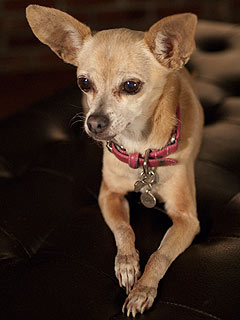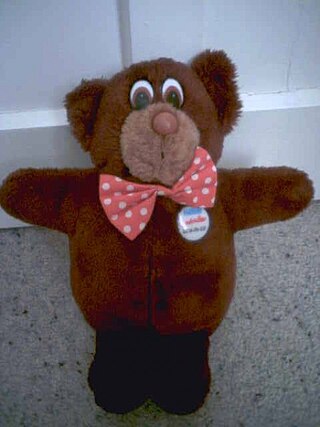
Advertising is the practice and techniques employed to bring attention to a product or service. Advertising aims to put a product or service in the spotlight in hopes of drawing it attention from consumers. It is typically used to promote a specific good or service, but there are wide range of uses, the most common being the commercial advertisement.

A television advertisement is a span of television programming produced and paid for by an organization. It conveys a message promoting, and aiming to market, a product, service or idea. Advertisers and marketers may refer to television commercials as TVCs.

"Where's the beef?" is a catchphrase in the United States and Canada, introduced as a slogan for the fast food chain Wendy's in 1984. Since then it has become an all-purpose phrase questioning the substance of an idea, event, or product.

Snickers is a chocolate bar consisting of nougat topped with caramel and peanuts, all encased in milk chocolate. The bars are made by the American company Mars Inc. The annual global sales of Snickers is over $380 million, and it is widely considered the bestselling candy bar in the world.

M&M's are color-varied sugar-coated dragée chocolate confectionery, each of which has the letter "m" printed in lower case in white on one side, consisting of a candy shell surrounding a filling which varies depending upon the variety of M&M's. The original candy has a semi-sweet chocolate filling which, upon introduction of other variations, was branded as the "plain, normal" variety. Peanut M&M's, which feature a peanut coated in milk chocolate, and finally a candy shell, were the first variation to be introduced, and they remain a regular variety. Numerous other variations have been introduced, some of which are regular widespread varieties while others are limited in duration or geographic availability. M&M's are the flagship product of the Mars Wrigley Confectionery division of Mars, Incorporated.

Got Milk? is an American advertising campaign on television and YouTube encouraging the consumption of milk and dairy products. Created by the advertising agency Goodby Silverstein & Partners for the California Milk Processor Board in 1993, it was later licensed for use by milk processors and dairy farmers. It was launched in 1993 by the "Aaron Burr" television commercial, directed by Michael Bay. The national campaign, run by MilkPEP began to add the "got milk?" logo to its "Milk Mustache" ads in 1995.

Gidget, nicknamed the "Taco Bell Chihuahua", was an advertising figure and mascot for Taco Bell from September 1997 to July 2000. The character she played was developed by TBWA. The Chihuahua is a breed commonly associated with Mexico.

Milky Way is a brand of chocolate-covered confectionery bar manufactured and marketed by Mars, Incorporated. There are two varieties: the US Milky Way bar, which is sold as the Mars bar worldwide, including Canada; and the global Milky Way bar, which is sold as the 3 Musketeers in the US and Canada.

Twisties are a type of cheese curl corn-based snack food product, available mainly in Australia and other Oceanian countries. In Europe they are marketed as Fonzies, and in France as "Belin Croustilles". It was launched in 1950 by the General Foods Corporation. The brand name is owned by The Smith's Snackfood Company.
"Prouder, Stronger, Better", commonly referred to by the name "Morning in America", is a 1984 political campaign television commercial, known for its opening line, "It's morning again in America." The ad was part of that year's presidential campaign of Republican Party candidate Ronald Reagan. It featured a montage of images of Americans going to work, and a calm, optimistic narration that suggested that the improvements to the U.S. economy since the 1980 election were due to Reagan's policies. It also asked voters why they would want to return to the pre-Reagan policies of Democrats.

Fast food advertising promotes fast food products and utilizes numerous aspects to reach out to the public.

Wieden+Kennedy is an American advertising agency best known for its work for Nike. Founded by Dan Wieden and David Kennedy, and headquartered in Portland, Oregon, it is one of the largest independently owned advertising agencies in the world.
"Happiness is a cigar called Hamlet" was an advertising campaign for Hamlet Cigars, which ran on television from 1966 until all tobacco advertising on television was banned in the UK in 1991. The campaign returned in cinemas in 1996, continuing there until 1999, with the final commemorative advert and the modified tagline, "Happiness will always be a cigar called Hamlet."
Deborah Kennedy is an Australian character actress recognised for several television and film roles, especially for her appearance in the famous Australian Yellow Pages advertisement with the line "Not happy, Jan!".
Foreign celebrity advertising is a popular form of advertising in parts of Asia, Eastern Europe and Latin America. The phenomenon is most pronounced when English-speaking celebrities do print advertisements or commercials for a non-English speaking market.

Gorilla is a British advertising campaign launched by the advertising agency Fallon London on behalf of Cadbury Schweppes in 2007, to promote Cadbury Dairy Milk brand chocolate. The centrepiece of the campaign was a 90-second television and cinema advertisement, supported by related media purchases in billboards, magazines and newspapers, as well as sponsored events and an organised internet presence. The total cost of the campaign is estimated at £6.2 million. The central television advertisement was created and directed by Juan Cabral and starred the actor Garon Michael.

Cookie Bear is a familiar character in New Zealand originally associated with Hudsons and later Griffin's biscuits. Cookie Bear's popularity grew with New Zealand children through the Cookie Bear Club, their shared love of Chocolate Chippies and his famous catchphrase "Dum-de-doo".
Milkybar, called Galak in Continental Europe and Latin America, is a white chocolate confection produced by Nestlé since 1936 and sold worldwide. According to Nestlé, Milkybar/Galak contains no artificial colours, flavours or preservatives. In Australia and New Zealand, Milkybar does not contain cocoa butter, and is therefore not labelled as chocolate.

The Japanese technology company, Sony, engaged in a variety of different marketing efforts, as one of the world's largest and most pervasive corporations.

Nesquik is a brand of food products made by Swiss company Nestlé. In 1948, Nestlé launched a drink mix for chocolate-flavored milk called Nestlé Quik in the United States; this was released in Europe during the 1950s as Nesquik.















